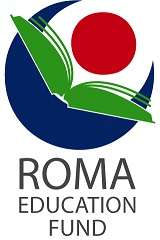Roma Education Fund
 | |
| Founded | May 12, 2005 |
|---|---|
| Founder |
Open Society Foundation World Bank |
| Type | Non-profit organization |
| Location | |
Key people |
Nadir Redzepi, Executive Director |
| Website | www.romaeducationfund.org |
The Roma Education Fund (REF) is a non-governmental organization established within the framework of the Decade of Roma Inclusion by George Soros and the World Bank in 2005.[1][2] The organization's goal is to reduce the educational achievement gap between Roma and non-Roma in Europe through the provision of scholarships to Romani students, supporting the development of quality education, and supporting the removal of segregation of Roma students.[3]
History
In July 2003, a conference "Roma in an Expanding Europe: Challenges for the Future", co-financed by the Open Society Institute, was held in Budapest. The conference resolved to establish the Decade of Roma Inclusion and the Roma Education Fund.[4]
Objectives
The primary objectives of the Roma Education Fund are:
- Ensuring access to quality education through the involvement of parents in the educational process, initiatives to reduce early school leaving, and the provision of educational materials to students in need.
- Improving educational quality through curriculum development and reform, anti-bias and tolerance teaching, the training of school mediators, and curriculum reform.
- Implementing integration and desgeregation programs for Roma students coming from segregated or special schools and classrooms into the mainstream education system.
- Improving access to preschool education for young Roma students through informational campaigns, assistance in the registration process and by working with students' parents to promote the benefits of early childhood education and care (ECEC).
- Increasing access to secondary and post-secondary education through the provision of scholarships and advice to secondary school students.[5]
Programs
Grants
The Roma Education Fund provides grants for governmental and non-governmental organizations in the Decade of Roma Inclusion countries, including small technical assistance (TA) and capacity-building grants to support the implementation of ongoing projects in the field of Roma education at all education levels, i.e. preschool, primary, secondary, tertiary and adult education, as well as policy development.
Reimbursable Grants Program
REF’s Reimbursable Grants Program provides support to Romani non-governmental organizations in accessing European Union Structural Funds and other associated funds. The organization provides a monetary advance to organizations that have been awarded grants from EU sources in order to allow them to avoid the delays in the disbursement of funding.
Scholarships
The Roma Education Fund Scholarship Program provides financial and academic support to Romani students in 12 countries of the Decade of Roma Inclusion, Moldova, Russia, Turkey, and Ukraine. In addition to providing financial aid, the scholarship program incorporates counselling and tutoring for students to support their education.[6] REF offers four academic merit-bases scholarships: Roma Memorial University Scholarship Program (RMUSP), Roma International Scholar Program (RISP), Law and Humanities Program (LHP), and Roma Health Scholarship Program (RHSP). These scholarship schemes support Romani students pursuing Bachelor, Master, and Doctorate degree programs.
Policy development and capacity building
This Program supports studies, technical assistance, strategy development and learning activities. Focus areas include:
- Strategic studies with strong policy relevance for the region and governments with which the REF is engaged in policy dialogue.
- Capacity building provided to local and central governments for directing more EU funds to support Roma communities and NGOs in the field of Roma education.
- Technical assistance and capacity building provided to civil society organizations to help access EU and other international donor funds.
- Capacity building provided to NGOs and local governments implementing REF projects.
European Court of Human Rights cases
The Roma Education Fund has played a role in a number of cases pertaining to education in the European Court of Human Rights. In 2007, research and observations by the Roma Education Fund were cited in the decision of the landmark case of D.H. and Others v. the Czech Republic concerning the discrimination of Romani children in the Czech educational system.[7] REF noted the high incidence of placing children into special schools in the Czech Republic compared with other Central and Eastern European countries, the lack of a national definition of "disability" in countries within the region, and the negative effects of special schools on educational achievement.[8]
References
- ↑ Europe needs a Roma working class
- ↑ "Poor and Unloved". The Economist. February 3, 2005. Retrieved 17 July 2013.
- ↑ Gardner, Andrew. "EU budget needs Roma provisions". European Voice. Retrieved 18 June 2013.
- ↑ History of REF
- ↑ "REF in One Page". Roma Education Fund. Roma Education Fund. Retrieved 10 July 2013.
- ↑ Schuetze, Christopher (7 July 2013). "Keeping Roma Students in High School". New York Times. Retrieved 16 July 2013.
- ↑ Thorpe, Nick. "Roma welcome anti-segregation ruling". BBC News. BBC. Retrieved 17 July 2013.
- ↑ "Case of D.H. and Others v. the Czech Republic". European Court of Human Rights. Retrieved 17 June 2013.
External links
- Roma Education Fund official website
- Roma Education Fund Romania website
- Decade of Roma Inclusion
- REF 2014 Annual report
- A Good Start: Mainstreaming the Access of Disadvantaged Romani Children to Quality Early Childhood Education and Care
- A Good Start: EU Structural Funds and Early Childhood Education and Care for Marginalize Romani Communities, 2014-2020
- Pitfalls and Bias: Entry Testing and the Overrepresentation of Romani Children in Special Education
- From Segregation to Inclusion: Roma Pupils in the United Kingdom - A Pilot Research Project
- School Segregation, School Choice and Educational Policies in 100 Hungarian Towns